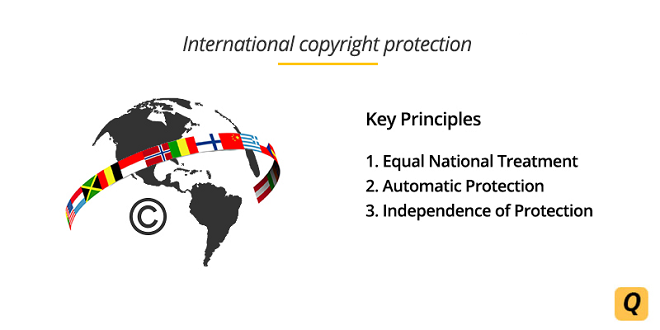Copyright and Image Protection International Law

The transborder nature of digital media could mean that local laws everywhere, from Australia to Zimbabwe, apply to what we publish and post. And where an article is downloaded and read can be more important than where it was published or uploaded, which makes digital writers and publishers potentially subject to the laws of 190 countries. Not surprisingly, the result is dizzying jurisdictional complexity. With no international consensus to guide how or even where jurisdictional disputes should be resolved, international legal questions are inevitable.
For those who write and publish digitally for large media organizations, awareness of potential legal challenges internationally could prevent legal actions that threaten to haul the employer organization into a foreign court. For lone, untethered writers who do not have the benefit of large constituent legal departments, the lack of significant material assets abroad and relative anonymity likely provide ample protection against lawsuits in most cases.
Good, thorough, professional information gathering, writing, and publishing practices should keep you out of court. Corroborate a claim with three credible sources, and you should be fine. Avoid intruding on a person’s privacy by publishing what is protected by statute, and you should be okay. Obtain copyright permission to re-publish digital content, and you shouldn’t end up in court. But the fast pace of technological innovation and, in contrast, the slow pace of change in the law guarantees that lawyers will have plenty to do for a long, long time.
Journalism Value: Accuracy
Without accuracy, what would be the point of journalism? The Society of Professional Journalists’ Code of Ethics instructs journalists to maximize truth and minimize harm, making accuracy the starting point for good journalism. Get the facts, check and double-check them, then report with enough contextualization that the collection of facts can tell a truth, if not the truth.
Copyright and Image Protection
Let’s flip the script to ask about the options for a copyright owner seeking to stop someone else’s infringement. First, ask whether it is worth your time, effort, and possibly expense to fight or stop the infringement. If the infringement is trivial, maybe ignoring it is the best response. If, however, you want to pursue action, here are the remedies.
International Law
The transborder nature of digital media could mean that local laws everywhere, from Australia to Zimbabwe, apply to what we publish and post. And where an article is downloaded and read can be more important than where it was published or uploaded, which makes digital writers and publishers potentially subject to the laws of 190 countries. Not surprisingly, the result is dizzying jurisdictional complexity. With no international consensus to guide how or even where jurisdictional disputes should be resolved, international legal questions are inevitable.
The slang tech refers to technical terminology or jargon used by individuals in the technology field. It includes abbreviations, acronyms, and specialized language specific to technology-related subjects.
Last word
For those who write and publish digitally for large media organizations, awareness of potential legal challenges internationally could prevent legal actions that threaten to haul the employer organization into a foreign court. For lone, untethered writers who do not have the benefit of large constituent legal departments, the lack of significant material assets abroad and relative anonymity likely provide ample protection against lawsuits in most cases.





